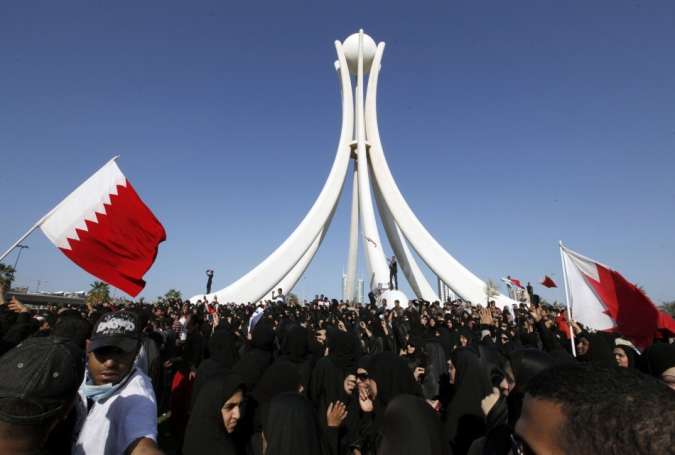15 December 2016 – This past year the Government of Bahrain drastically increased its suppression of Bahraini civil and political society. Today, Bahraini human rights organizations stand in solidarity with the people of Bahrain in the face of systematic human rights abuses in proclaiming the first Bahrain Solidarity Day.
In 2011, hundreds of thousands of people rose up in support of democracy and human rights in Bahrain. After enduring decades of structural inequalities, corruption, and repression, nearly half the country’s citizen population gathered to demand reform. The government responded swiftly, and severely. Riot police flooded the streets, employing excessive and indiscriminate force to disperse the demonstrations and suppress the movement. Assisted by a Saudi and Emirati forces, Bahraini authorities violently put down the peaceful uprising, leading to thousands of arrests, hundreds of injuries, and dozens of deaths.
Since 2011, the Bahraini authorities have taken steps to institutionalize this repression by passing broad, wide-ranging laws that have created a legal framework, which is now used to target human rights defenders, journalists, and civil society at large.
Following the repression of the 2011 pro-democracy movement, King Hamad established the Bahrain Independent Commission of Inquiry (BICI) in July to analyze Bahraini authorities’ violations during the pro-democracy movement. On November 2011, the BICI commission handed over their finalized report to King Hamad, outlining 26 recommendations for key reforms for the Government of Bahrain, all of which the government accepted, yet today, the vast majority of these recommendations remain unfulfilled.
This past summer, the government unleashed a new campaign of repression as it arrested prominent Bahraini human rights defender Nabeel Rajab, who faces 15 years in prison for exercising his freedom of expression, and took steps to permanently dissolve Al-Wefaq, the country’s largest political opposition society. Nabeel remains in prison in poor conditions, after his trial was postponed multiple times. His next hearing is scheduled for 15 December 2016, where he could face up to fifteen years in prison for tweets. Al-Wefaq’s Secretary-General Sheikh Ali Salman recently had his 9-year sentence upheld in regards to a peaceful speech he gave. Since the dissolution of Al-Wefaq, in June 2016, the authorities have increased their harassment of almost all major political societies.
Fadhel Abbas, the Secretary-General of Al-Wahdawi, is currently serving a 3-year prison sentence for calling the Saudi war in Yemen, in which Bahrain is a belligerent, unconstitutional. The National Democratic Action Society – Wa’ad – has been under threat, with their leader banned from travel and repeatedly subject to police questioning in the past year. Ebrahim Sharif, the former Secretary General of Wa’ad, served 4 years in prison following his arrest, torture and prosecution by military court in 2011; he served another year in prison after he called for sustained peaceful opposition in July 2015, and was charged again in November 2016 after he criticised Prince Charles of the United Kingdom’s visit to Bahrain. These latest charges were later dropped, following international pressure.
The government has likewise subjected civil society to similar widespread harassment. Bahraini authorities have summoned more than 75 Shia religious leaders and clerics for interrogation. Many have been charged and imprisoned for taking part in the peaceful sit-in in Diraz, which began on 20 June 2016 following the arbitrary denaturalization of Ayatollah Sheikh Isa Qassim, Bahrain’s leading Shia cleric.
Harassment of human rights defenders and activists include interrogations and restricting their freedom of movement. Since June, the government has employed the practice of travel bans to restrict civil society from leaving the country and participating in international human rights conferences and meetings, such as the United Nations Human Rights Council. On 29 August 2016, the authorities stopped the Head of International Relations and Women & Children’s Rights Advocacy at BCHR, Nedal Al-Salman, at Bahrain International Airport. She was attempting to travel to Geneva via Doha to attend meetings at the United Nations Human Rights Council (HRC). Nedal has since been summoned and charged with “illegal gathering.” The government prohibited Hussain Radhi, a member of the BCHR Documentation Section, from travelling across the King Fahd Causeway between Bahrain and Saudi Arabia, on 23 August 2016. Officials at the passport office informed Radhi that the Department of Cybercrime at the CID had issued the ban, and he has since been charged with crimes related to tweets. Additionally, the government has targeted human rights lawyers like Mohamed Al-Tajer, a well-respected human rights lawyer and outspoken advocate, with travel bans and criminal charges for his free expression.
Such restrictions on activists, human rights defenders, opposition figures, and religious leaders constitute clear violations of the right to freedom of speech, expression, assembly, and movement.
Stifling civil society, dissolving legitimate peaceful political opposition groups, imprisoning activists for peaceful speeches, sentencing individuals who call for human rights, and passing vague and broad laws to suppress free speech and expression does not signify progress for Bahrain.
We, in the Bahraini human rights community, remain deeply concerned with the human rights situation in Bahrain. We call on the Government of Bahrain to take active steps to overturn the repressive measure taken this summer. We call for the release of all activists and prisoners of conscience and demand the Bahraini government hold all human rights violators accountable.
Today we stand in solidarity with all those in Bahrain who continue to call for human rights and dignity for all in Bahrain.
Signed,
Americans for Democracy & Human Rights in Bahrain
Bahrain Center for Human Rights
Bahrain Institute for Rights and Democracy
European Centre for Democracy and Human Rights





